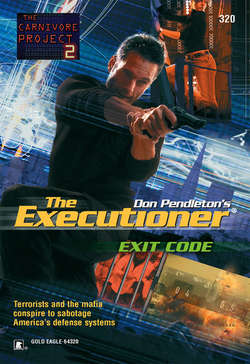Читать книгу Exit Code - Don Pendleton - Страница 8
Prologue
ОглавлениеAfghanistan
Colonel Umar Abdalrahman stood at the top of a rise and stared at the smoldering ruins of his main operations center nestled in the mountains bordering the Khyber Pass.
His crack team of commandos—handpicked from an elite group among Abdalrahman’s various allies throughout the Arab inner circle—had not yet found the remains of his nephew, Sadiq Rhatib. Abdalrahman silently thanked Allah for that. It meant there stood a chance that Rhatib was still alive; if that was true, then he would find his nephew. His men hadn’t been able to gain access to the interior of what had once been their main encampment. Whoever had launched the assault against them had used explosives to blast apart the front wooden facade, and this had collapsed the inner structure. The cavernous remains would not be easy to clear, and Abdalrahman wasn’t sure he even wished to disturb what was certain to have become a tomb for many of his comrades.
The former mujiahideen warrior turned and studied his surroundings. Bodies were strewed across the neighboring hillside. Abdalrahman stood upon what had served as a helipad. The small attack helicopter they had left there was gone, and there were brass shell casings scattered everywhere. The bodies along the hillside had been stripped of their equipment.
It looked a lot like the handiwork of nomadic members from radical mujiahideen tribes, but Abdalrahman considered this move a bit too bold. His countrymen were not quite so confrontational; at least, not by their own choosing. They would not have planned such an attack against a numerically and technologically superior force without support.
Abdalrahman thought he knew exactly who had given them that support: the American named Cooper. What concerned Abdalrahman most was that if his nephew were not buried deeper within the confines of the rubble, then he had managed to escape and had gone into hiding, he had fallen into enemy hands. In either case, Abdalrahman wanted to know—he had to know. Everything in their plan depended on the safety of his nephew. If Sadiq was dead, it would be significantly detrimental to their plans.
One of Abdalrahman’s men approached—his second in command—and reported, “I do not know how much farther we can go without heavy equipment, Colonel.”
“Keep digging,” Abdalrahman replied with a wave of his hand. “I have neither the time nor the patience to await the arrival of heavy equipment. There were not a lot of explosives used. There has to be a gap somewhere.”
The man bowed slightly and walked down the hill to pass on the orders to his men. Abdalrahman looked around him one more time with disgust, and his heart was saddened by the sight. His men had died bravely; he wouldn’t have expected anything less. The New Islamic Front would not be scattered to the four winds as other groups had in the past. His men were different; different kinds of soldiers fighting a different kind of war.
Abdalrahman was a practical man, and his mentors and trainers had always touted him as a gifted soldier. He had a leadership ability that was exceeded only by his uncanny skill as a tactician. He hadn’t learned to fight the same way as conventional soldiers during his time battling the Soviet invasion of his homeland, neither had he taught his men to fight that way. Abdalrahman believed that the only way to gain victory against your enemy was to fight in a fashion they had never before encountered. Throughout military history—which he’d studied carefully at an underground university in Baghdad during the height of the Gulf War—armies had lost any battle or war where the tactics of the enemy were unlike any ever encountered by that army. The Crusaders had learned this about the Turks, the English about the Indians, and the Americans about the North Vietnamese.
And now, the Westerners were about to learn this about the New Islamic Front. Abdalrahman meant to teach that same lesson to the man named Cooper. And he would do it in such a way that it would never be forgotten. He would write it in the blood of the American people, as it ran into the gutters and streets of some of their greatest cities.
And that was exactly where it belonged.
